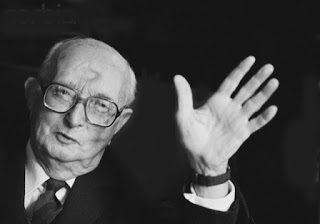Before the rise of Hitler, and even before the rise Mussolini, there was a concept of national-socialism. National-Socialism was a general term. Anne Morrow Lindbergh (wife of the aviator) used national-socialism as a general term as late as 1940 in her book, The Wave of the Future.
But because Hitler’s was by far the most famous movement to call itself national-socialist, the concept became specifically identified with his development of it, which includes certain ramifications of Darwinism that distinguish the German movement from its Italian analog.
Therefore, if our use of words were more logical, we should say that Fascism was the Italian form of national-socialism, instead of saying that National-Socialism was a type of fascism.
The name Fascism is rooted in specifically Italian history. On that basis alone, it seems odd to apply the term to any movement outside of Italy.
But what happened is this. Fascism became world-famous before many people heard about national-socialism. Consequently, just as Xerox, the preeminent maker of photocopy-machines, saw “xerox machine” and “xeroxes” become general terms for copiers and the copies that they produce, “fascism” (with a small f) superseded “national-socialism” as the general name for nationalist movements that guard the interests of workers.
Nowadays, when one wishes to refer to such a movement while avoiding resonance with the specific movements of Mussolini and Hitler, one can use the term “social-nationalist” — which is obviously just another way to say national-socialist.
Nonetheless, for better or worse, “fascism” remains prevalent as the general term for such movements. Instead of properly categorizing Fascism as Italian national-socialism we bizarrely categorize Hitler’s movement as “German fascism.”
This is very convenient for Communists, because, unlike “national-socialism,” which is descriptive, “fascism” has a meaning that is not readily apparent, and is thus easily misrepresented. (You will also notice that the descriptive term National-Socialism is rarely used even in regard to Hitler’s movement, replaced almost always by the nondescriptive “Nazism”: there is a purpose in this.)
If we cannot do away with this generalized use of “fascism,” we should at least insist that it be applied only to movements that Mussolini or Hitler would recognize as what they represent.
The problem that Maurice Bardèche identifies in this introduction to his 1961 book, Qu’est-ce que le fascisme? (What is fascism?), is the reckless and hypocritical use of even that misbegotten term, without regard for any reasonable definition.
From Qu’est-ce que le FASCISME? (1961)
There is only one objection to this definition, but it is embarrassing. It is that there is no fascist who is willing to recognize fascism in the military dictatorships of Latin America, in the fiefs of fruit-juice vendors, or even in Franco’s Spain, which, moreover, cannot honestly be equated with the preceding examples. Fascists refuse to recognize themselves in what the intellectuals, the newspapers, and the political parties call fascism. They go farther: they condemn, as their adversaries, these examples that are placed before them. What then is this fascism in which we see everything other than the press, the radio, and the learned men of our time?
If I were one of a kind, this clarification would not be worth the effort. But a strange prodigy occurs: the fascist writer, the fascist intellectual, is nowhere to be found; the government that is willing to be charged with fascism exists only at the antipodes, and it is as archaic as a Negro king[3]. But on the other hand there are fascist groups and they do not hide it; there are young fascists and they proclaim it; there are fascist officers and one trembles at this discovery[4]; finally there is a fascist spirit and above all there are thousands of persons who are fascist without knowing it, under another hat that they wear and that they regard with suspicion, of which fascism, as we conceive it and not as one describes it, would be their entire hope if one explained to them what it is. Behold the mirror that reflects our hearts: I want them to recognize themselves. Or that they know, at least, in what cause they are not our brothers. Even our enemies ought to know what they are fighting. The weather (le temps) that filled our sails has made us sail past the Cape of Lies. The Land of Lies recedes into the mist; twenty-year-old eyes no longer see it. And now, in the wind that is rising, it is no longer necessary to be afraid of words.
______________
[1] Most likely referring to Fidel Castro. One of Bardèche’s chapters asks if Castro is a fascist.
[2] Charles de Gaulle, of course.
[4] In May 1958 a group of generals, supported by “committees of public safety,” seized control in some of the French colonies and in Corsica, and demanded that Charles de Gaulle take over the French government and stop the dissolution of the French Empire. De Gaulle had given them reason to believe that he supported their cause, but once in power, he did the opposite of what they wanted. These generals were called “fascist” by the Communists in France. There seems to be some ironic humor in Bardèche’s reference to the “discovery” of the “fascist officers,” since as Gaullistes they surely did not consider themselves fascist, any more than De Gaulle himself.
